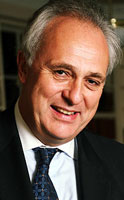I visited Sri Lanka from 15-17 July because a peaceful and prosperous Sri Lanka matters to the UK. It matters because of the large number of Sri Lankans who have made Britain their home yet retain deep emotional bonds to this island; because of the strong business and commercial links between our two countries; and because our own experience in Northern Ireland has taught the UK that resolving a long-standing political grievance whilst combating a violent threat to innocent civilians is one of the greatest challenges a nation can face.
The last few months have seen significant achievements in some areas. The March local elections, the first free elections in the east for 20 years, give reason for hope. The Eastern Provincial Council elections that followed in May represent an opportunity to devolve new powers to the regions and give local people a clearer voice in how they are governed.
 |
| Lord Malloch Brown |
Questions have been raised over how free and fair these elections were. In preparing for the North Central and Sabaragamuva Provincial Council elections in August it is important to learn from this experience.
I was pleased to meet with members of the newly formed Eastern Provincial Council and encourage them to demonstrate their commitment to the security and prosperity of people in their region. One important challenge going forward will be the transition of the TMVP from paramilitary to political party through verifiable disarmament and the release of child soldiers.
Giving all communities in the east a say in how the province is run continues Sri Lanka’s democratic tradition. The vibrant political life in Sri Lanka is another feature of this tradition, and one that I witnessed first-hand during my visit.
I met with leaders of varied political backgrounds, in Colombo, Trincomalee and Hambantota to discuss the key challenges that face Sri Lanka today. Like in any healthy democracy there were disagreements between parties about how best to overcome these challenges. This breadth of views is strength, and one that underlines the importance of the All-Party Representative Committee’s work to establish an agreement on a political solution to the causes of conflict and highlights the need to broaden this process to include all parties.
Sri Lanka’s journalism is a foundation stone of its democratic tradition and plays a crucial role in its politics. The people of Sri Lanka are the best judges of how to overcome the challenges they face as a nation. To make a sound judgement they need the opportunity to hear and discuss a wide range of opinions. It saddens me that recent attacks on the media have reduced the space for discussing diverse political views and threaten the future of a dynamic media community.
The space for alternative views is further hampered by the operation of paramilitary organisations throughout the island and the continued reports of abductions, extra-judicial killings and intimidation of civilians. These issues create a climate in which it is very difficult to build trust between communities which will be an essential part of any lasting political solution to the conflict. Firm action is needed by the Government, and others, to strengthen mechanisms to ensure the protection of fundamental rights and the prosecution of those responsible for violating them.
My previous roles at the World Bank and the UN have shown me that when a nation is confronted by serious challenges the support and advice of friends and allies can play an essential role. Sri Lanka has many friends that stand ready to offer assistance to contribute towards a peaceful resolution of the conflict. I met with a range of foreign ambassadors during my time in Colombo and all stated their willingness to support the efforts of the people of Sri Lanka to take steps towards peace. The nations that these senior diplomats represent are willing to share their resources and experience. In offering a different perspective and sharing expertise complementary to Sri Lanka’s own, the international community can play a role in helping Sri Lankans of all communities find their own solution to the conflict.
The internationally-facilitated ceasefire ended in January, demonstrating that international involvement is no guarantee for peace. Since then many innocent civilians from all communities and all parts of the island have died tragically. In Trincomalee, I visited an Internally Displaced Persons’ camp and witnessed that for many the suffering will continue long after the explosions and gunfire have ended. My visit and the discussions I had with a variety of Sri Lankan people have left me believing that the international community must do what it can to mitigate this terrible suffering both now and in the future. But ultimately only a resolution of the conflict will end this human suffering and it’s only through Sri Lankan communities finding ways to work together and build mutual trust that this will happen. The UK stands ready to help.
The writer is Britain’s Foreign Office Minister for Africa, Asia & the UN. | 
